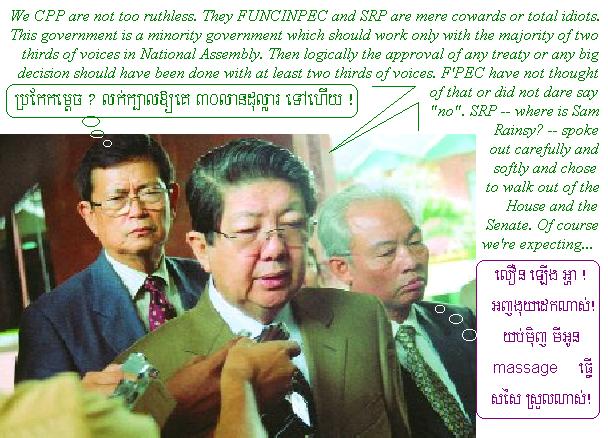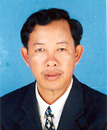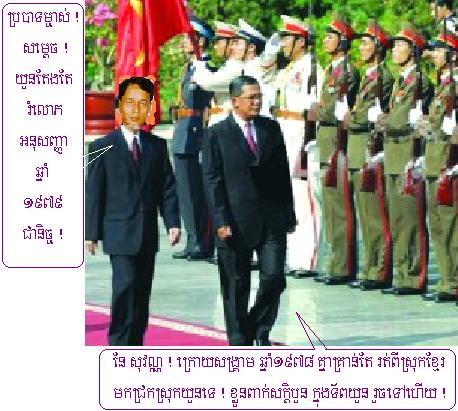
CARICATURE : SOK AN AFTER SENATE 'S ENDORSEMENT OF BORDER TREATY
| RENCONTRER DIEU |
camboDIATRIBE | MEET WITH GOD |
Analyse sommaire de la situation au Cambodge faite par François
Ponchaud sur France Culture.
François Ponchaud
- Spécialiste du Cambodge.
- Séjourne au Cambodge au titre des Missions étrangères
de Paris.
Cambodian opposition leader tells supporters to stand firm ahead
of party anniversary (2005-Nov-27)
PHNOM PENH, Cambodia (AP) - Cambodia's opposition leader, who
lives in self-imposed exile in France, called on his supporters Sunday
to stand up to government intimidation as the party prepares to mark its
10th anniversary. "We will always uphold our ideals and principles.
We will never give in to intimidation and will never sell our soul,"
Sam Rainsy, leader of the party named after himself, said in an e-mail
to The Associated Press. Sam Rainsy fled to France earlier this year after
losing his parliamentary immunity, making him liable to arrest in several
politically inspired lawsuits. Cambodia's justice system is widely seen
as tainted by politics. His remarks came as his supporters in Cambodia
prepared to mark the party's 10th anniversary on Tuesday, despite mounting
pressure from the ruling coalition led by Sam Rainsy's archrival, Prime
Minister Hun Sen, head of the Cambodian People's Party.
Sam Rainsy, who is known for his attacks on government corruption and illegal
logging, was sued for defamation earlier this year by Hun Sen and Prince
Norodom Ranariddh, the leader of the CPP's junior coalition partner, the
Funcinpec party. Two other Sam Rainsy lawmakers also had their immunity
removed, and one is now in jail after being convicted on a controversial
charge of trying to form an illegal armed group to overthrow the government.
Yet Sam Rainsy said his party is holding together, adding that it represents
the "people's hope for change." "I want to congratulate all SRP supporters
and leaders for keeping up the good work, which allows the party to continuously
grow regardless of difficulties and pressure they encounter," he said.
|
|

CARICATURE : SOK AN AFTER SENATE 'S ENDORSEMENT OF BORDER TREATY |
N.P. : SRP, NGOs, civil societies, mass media should call upon the judgement of the Constitutional Council before the supplemented border treaty go to the King for signature. Moreover, the Cambodian Constitution must be reformed in many aspects : 50%+1 voices for confidence in government, electoral laws, etc.
Thirty years after the killing fields, Pol Pot's deputy is brought
to justice (2005-Nov-09)
By Andrew Williams : The man who served as deputy to Pol Pot
has admitted responsibility in part for Cambodia's genocide and is prepared
to go before a United Nations tribunal to be questioned about his crimes.
Nuon Chea, 78, was the closest comrade of one of the 20th century's most
blood-stained dictators for more than 30 years. He was personally responsible
for ordering thousands of executions in Cambodia. In a rare interview,
he confessed: "Yes, we take responsibility. We
do not deny it but there are different types of responsibility: executive,
legal, moral. Our mistake was that we did not go out into the country's
fields to find what was really happening." A quarter of the
population - about two million people - were executed or died of starvation
during Cambodia's communist revolution 30 years ago but no one has ever
been brought to justice.
Since Pol Pot died in 1998, the man known as "Brother Two" has lived quietly
in the countryside. The Cambodian government has shown little interest
in bringing him before a court, although many believe he was one of the
chief architects of the policy that led to the killing fields, not least
because many senior and middle-ranking figures in national and regional
government are former members of the Khmer Rouge. But it now appears the
United Nations trial of Nuon Chea and other senior figures will happen
after foundering time and again for eight years. International funding
has been secured and the UN expects the process to begin early next year.

|
VNA : The Joint Committee of the ruling alliance of Cambodia consisting of the Cambodian People's Party (CPP) and FUNCINPEC Party have held a quarterly meeting to review the co-operation situation between the two parties. |
 |
M. Preuk : Funcinpec finally shows its true color: it is no more than a puppet of a puppet!
2) Former King Sihanouk Will Not Return to Cambodia
Reaksmey Heng, Phnom Penh, Cambodia - A Royal palace official
said on condition to remain anonymous that former King Sihanouk will not
return to Cambodia, but he did not specify the reason. The announcement
was made a few days after Prince Norodom Sirivudh, Funcinpec party's secretary
general and co-Minister of Interior said Saturday that former King Sihanouk
would accompany his son, King Sihamoni who will return to Cambodia on November
6. King Sihamoni left for Beijing on October 25 to visit his King father
who is in Beijing for medical treatment. The people who follow the news
were happy to hear about the good news thinking this will stop the tension
between the border activists and the government on border issues.
Mr Khieu Kanharith, on Saturday said that the local TV stations would stop
their broadcasts of the documents on the history of border issues. He cannot
be reached for comment on news that the former King would not return to
Cambodia. The Royal palace official said that it seems like the former
King does not want to be the mediator in the signing of the Supplemental
border treaty with Vietnam. [ VOA ]
| Rong Chhun in high spirit in jail (2005-Oct-27)
Samngatki : Rong Chhun, the President of the Cambodia Independent Teachers' Association, currently jailed by order of Prime Minister Hun Sen for daring to criticize the latter on his border policy with Vietnam, is maintaining a high spirit during his detention. From his crowded jail cell, which he is sharing with 11 other inmates, Rong Chhun sent out a message asking his supporters to stay strong on their condemnation of the recent arrests and detention of border critics. He also called on his supporters to continue the fight. Rong Chhun was denied bail by the Phnom Penh municipal court. |
 |
Sihanouk a déjà empêché les Khmers de
se défendre contre les Vietnamiens (2005-oct-20)
Le 24 juin 1967 la représentation permanente de la République
démocratique du Vietnam du Nord (NVN) est élevée au
rang d’ambassade. Ainsi, à partir de cette date, les ressortissants
NVN et VC qui auraient maille à partir avec les Autorités
locales khmères, pourraient trouver refuge dans des bâtiments
couverts par l’immunité diplomatique. Les NVN et VC bénéficient
donc au Cambodge d’une double protection : dans les zones frontalières,
du statut d’un Etat de refuge officiellement non belligérant qu’était
le Cambodge et dans la capitale, de l’immunité attachée à
leur résidence diplomatique.
Mais, redoutant les rapports des observateurs de la CIC
(Commission Internationale de Contrôle), qui auraient pu déceler
la présence des NVN et VC au Cambodge, N. Sihanouk n’a pas hésité
contre toute attente et toute logique (car nous verrons plus tard qu’il
voulait aussi, 16 années plus tard, se débarrasser des NVN
et VC, mais trop tard) à renvoyer
cette commission. Le 9 octobre 1969, il mit fin à la mission
de la CIC qui devait impérativement selon son ordre, rapatrier
tout son personnel au plus tard le 31 décembre de la même
année. Alors, à partir de cette date, les NVN et VC étaient
libres de bâtir sur le sol cambodgien des «sanctuaires»
militaires à l’abri de tout témoin. Ainsi, les députés
et administrateurs khmers en charge de cette région ne pouvaient
s’y rendre sans essuyer des coups de feu de semonce. Les Vietnamiens se
conduisaient comme s’ils en étaient les maîtres tout puissants
et auraient pensé, comme d’habitude, que là
où ils se trouvaient, là était leur pays.
De plus, pour leurs dépenses courantes, ils utilisaient de faux
riels imprimés en Chine, dont ils imposaient le cours
forcé à la pointe des fusils d’assaut. Ce qui donnait lieu
à des incidents assez fréquents. Quand les avions US ou sud-vietnamiens
les poursuivaient, ils se refugiaient sous les maisons cambodgiennes sur
pilotis, menaçant leurs occupants de pires sévices en cas
d’opposition. Là où la milice villageoise, armée
de vieux fusils, intervenait, l’incident se terminait par des blessés
et aussi des morts. Parfois, les NVN et VC entreprirent des opérations
préventives en encerclant par surprise ces milices et étaient
arrivés à les désarmer.
Mis au courant de ces incidents, Sihanouk lançait
à la radio, l’ordre au général Lon Nol de désarmer
les milices villageoises car, dit-il, celles-ci n’avaient pas
de savoir-faire pour garder ces armes… désormais nos villageois
seront protégés par des soldats de métier plus à
même de les garder. Mais étant donné que pour tout
le Cambodge, il n’y avait que 36.000 soldats, les villageois n’étaient
nullement protégés d’une éventuelle incursion vietnamienne.
Quand Lon Nol tardait à exécuter cet ordre aberrant, Sihanouk
revenait maintes fois sur les antennes de la radio nationale pour le presser
d’agir. Quand la même intervention du MTV/TC (Maître de
toutes vies, trônant sur la tête de chaque Khmer -- SIHANOUK)
n’était plus entendue à la radio, nous comprenions que nos
milices villageoises étaient, hélas, toutes désarmées.
A partir de ce moment, les NVN et VC avaient une autre protection, la troisième
: les maisons de nos villageois ; ceux d’entre eux qui pouvaient déménager,
se retiraient et parfois venaient se plaindre devant leurs députés.
Comme il fallait s’y attendre, le moral de nos populations frontalières
baissait considérablement. Si, auparavant quand un chien aboyait
dans la nuit, les gens sortaient pour aller voir ce qui arrivait dans leur
village -- miliciens en tête -- après ce désarmement,
ils étaient plutôt prêts à s’enfuir avec leurs
maigres baluchons.
Une société qui n’est plus animée
par un réflexe d’auto-défense est une société
vaincue avant l’heure.
DOUC Rasy, ancien député du Sangkum Reastr Niyum
| Pen Sovann : Vietnam violated the agreement between the two countries
(2005-Oct-13) M. Preuk : Pen Sovann, the former Prime Minister of the People's Republic of Kampuchea (PRK), has declared that Vietnam is the party who always violated the 1979 agreement between the PRK and the Socialist Republic of Vietnam (SRV). The violations included the moving of the border poles [into the interior of Cambodia] in Phnom Den, Takeo province; in Tuol Krasaing, Svay Rieng province; in Kampong Cham province, Memot district. At the same time, Vietnam had also sent to Cambodia a large number of settlers. That was why Pen Sovann protested at the time. Furthermore, Pen Sovann said he opposed the formation of K-5, a program in which Cambodian population was forced to clear forests along the borders. Pen Sovann said that this was a criminal act that he ought to oppose. Furthermore, because he ruled without strictly following the communist doctrine, he was then accused of being a traitor to communism. Pen Sovann also accused 90% of the Vietnamese-installed communist Cambodian party which instigated the coup d'état against him, and later his arrest and imprisonment in Hanoi. |

Pen Sovann : Camarade! Le Vietnam a toujours violé les accords de 1979! Hun Sèn : Mon pote! Après la guerre de 1978, j'étais un simple réfugié au Vietnam. T'étais déjà commandant bodoï! |
|
|
( PRÉCÉDENT ) |
|
|
|
|
|
|
|
|
|
|
|